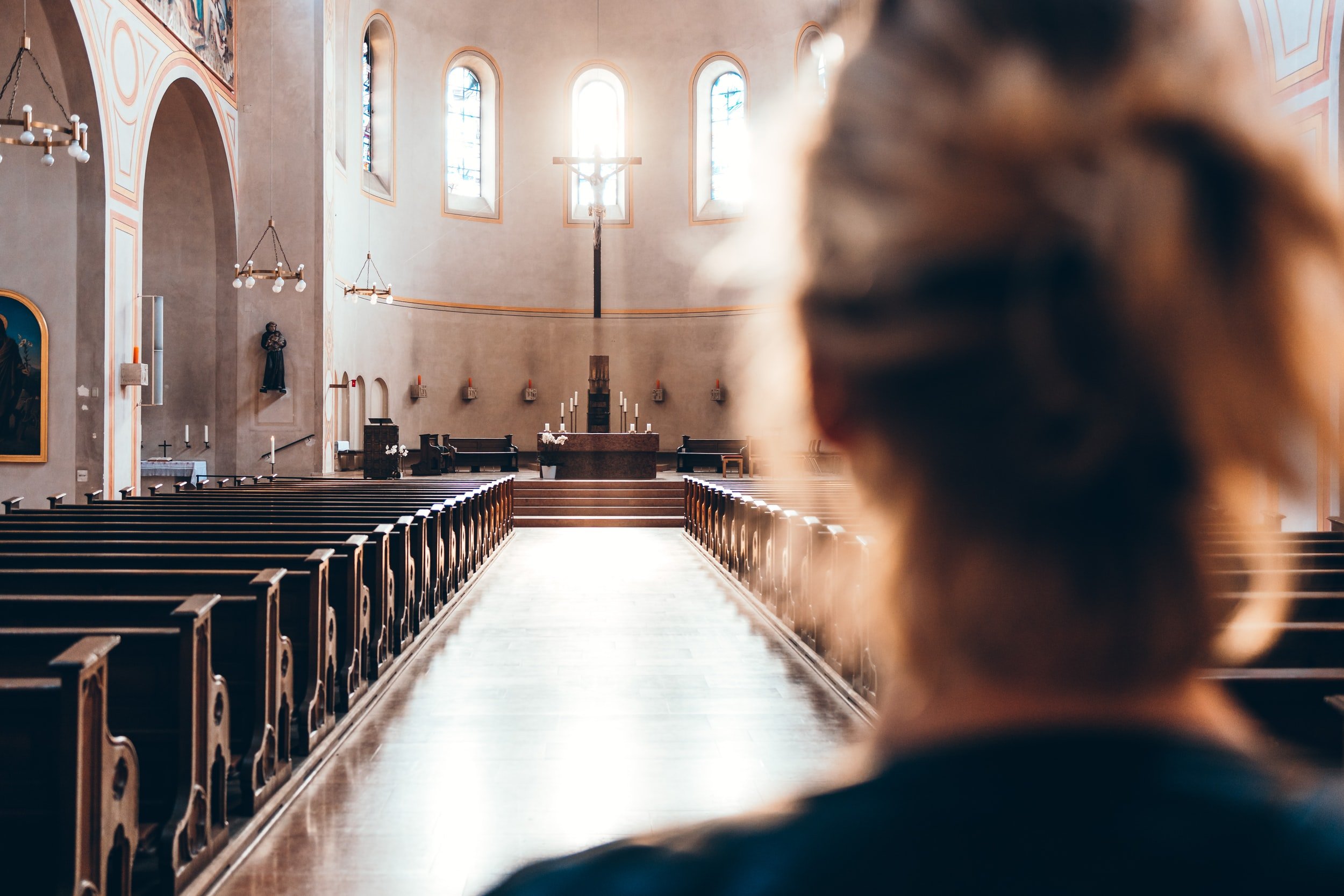When Spiritual Deconstruction Leads to Spiritual Homelessness
Tell me if you’ve heard this before: A lonely hero sets out to find herself, embarking on a sacred journey. Her character, strength, and skills are tested. She struggles and fails. But with the assistance of her faithful friends and a trusted guide, she overcomes her fears and defeats her adversaries, gaining a sacred reward. She returns home triumphant and transformed, bringing with her a treasure to heal her land.
In 1949, Joseph Campbell popularized his mono-myth, “the hero’s journey,” a story structure seemingly as old as time. Today, almost every blockbuster movie from The Lord of the Rings and Star Wars to Harry Potter follows Campbell’s mythic plot-line. In his writings and lectures, Campbell eloquently reveals how the great questions of life—man’s search for meaning as well as the quest for truth—are best expressed in mythic tales of adventure. If you’ve ever set out on your own sacred journey in search of meaning and spiritual transformation, you know these stories are true whether they ever happened or not. As Campbell reminds us, “Myth is what never was, yet always is.” You also know that once you’ve found that “one thing you lack,” a return to normal is impossible. But go home you must.
Every hero’s journey must eventually end, if for nothing else than to make room for a new beginning. Frodo returns to the shire, Odysseus comes home to Ithaca, and Simba ascends Pride Rock. The sacred journey is a circle leading back home. Though it’s necessary to leave home in order to achieve your quest, your search for truth and transformation isn’t complete until you come home with the wisdom gained along the way. Your pilgrimage ends where it started: back at the beginning.
What’s weird is that nothing seems to have changed back home. It never does. Unless you’ve heeded the call, set out on your own, and encountered the transformational experience of the divine, life goes on as usual. Same old job, same old family, same old politics, same old worn-out religion. The only thing new is you.
Soldiers returning home from World War I experienced something similar. Most of the American GIs who boarded transport ships to the European theater of war in 1917 had never been more than a few miles from home in their entire lives. Imagine those Nebraska or Kansas farm boys born and bred on the same patch of prairie catching sight of the Eiffel Tower for the first time. As the old song goes, “How you gonna keep ‘em down on the farm after they’ve seen Paree?” But it wasn’t just the wine and women in Paris they’d seen; the horrors of war changed them forever. How do you explain to your family and friends what it’s like to dodge sniper bullets, sleep in the freezing mud, or shovel up the blown-up remains of your comrades? Those things stick to you, those scars never heal. A hidden world of suffering pulsated just beneath the surface, disguised by a million stiff upper lips.
“You’re met with questioning eyes and dubious stares, wondering just where and how you’ve been radicalized.”
Like them, as you reintegrate back into your old life, you might experience a bit of shell shock. Nothing makes sense anymore. Your old friends, family, and faith community feel like strangers. And odds are, they don’t understand you either. You’re met with questioning eyes and dubious stares, wondering just where and how you’ve been radicalized. It’s one thing to be religious, it’s quite another to take your spirituality so seriously that it calls into question the American dream and conservative fundamentalism. But your journey has given you “eyes to see” the world, yourself, and your faith in new ways. Much of the normative social, political, economic, and theological assumptions you once held close have been found wanting. Maybe Thomas Wolfe was right, you really can’t go home again.
Jesus tried to, and it didn’t work.
After launching His public ministry, calling His first disciples, healing the sick, driving out demons, and running afoul of the religious leaders, Jesus goes home. But instead of receiving a hero’s welcome, his family thinks he’s nuts:
Then Jesus went home, and once again a crowd gathered, so that He and His disciples could not even eat. When His family heard about this, they went out to take custody of Him, saying, “He is out of His mind. And the scribes who had come down from Jerusalem were saying, “He is possessed by Beelzebul,” and, “By the prince of the demons He drives out demons.”…Then Jesus’ mother and brothers arrived. Standing outside, they sent someone in to call him. A crowd was sitting around him, and they told him, “Your mother and brothers are outside looking for you.” “Who are my mother and my brothers?” he asked. Then he looked at those seated in a circle around him and said, “Here are my mother and my brothers! Whoever does God’s will is my brother and sister and mother.”
Three chapters into the Gospel of Mark and Jesus is already in trouble. Conflict followed Him wherever He went, mostly because He refused to allow the religious leaders of His day to continue oppressing and dehumanizing the masses with distorted views of God. Thinking Jesus is taking things just a little too seriously, His family comes out to “seize” Him, a word Mark uses elsewhere to describe political detainment. We can’t know their motivations, but their attempt to silence Jesus must have been motivated by fear, or at least a desire to protect Him and their diminishing family reputation.
On a personal level, this recently happened to me. My family called me, “concerned” about several of my Facebook posts. They couldn’t understand my public support for “Black Lives” and my growing frustration with the unholy union between Christianity and a particular political party. But it was evident their concern was simply code for control, for an attempt to dominate the conversation and force me back into compliance. I resolutely refused. They got mad and hung up, and I haven’t spoken to them since. As unfortunate as the conversation turned out to be, it was revelatory, opening my eyes to something universal. Sometimes the most oppressive, controlling, and domineering forces in life are close friends and family. After all, they remember you when. They know your story, who you are, and where you come from. The audacity to outgrow them! How dare you question what everyone accepts as normal. Later on in Jesus’ journey, those who knew Him best retorted in so many words, isn’t this just Mary’s bastard son anyway?
“Sometimes the most oppressive, controlling, and domineering forces in life are close friends and family.”
So it shouldn’t surprise us to see Jesus’ family then—and ours now—strongly reacting to behavior and beliefs foreign to familial origin. If your sacred journey causes you to disagree with cultural Christianity, to befriend socially unacceptable people, to fight for the poor, to challenge the marriage of Church and political party, and to liberate those suffering under spiritual abuse, your family and friends are probably going to take umbrage with you. They might even label you a heretic, or in today’s vernacular, a socialist! “When I give food to the poor, they call me a saint. When I ask why the poor have no food, they call me a communist,” an exacerbated Dom Helder Camara exclaims.
But as we see with Jesus, the alienation between Him and His family is mutual. He refuses to see them and instead introduces a new community, a new family free from oppression, free from domination and control. This new family isn’t based on blood, but rather on the common pursuit of love, justice, compassion, and freedom. And in so doing He reveals this liberating truth: Your faith journey is between you and God. Nobody has the right to interrogate its validity. You did the work, you went on the journey, you found the Holy Grail.
When you have been transformed, and your family or community have not, they will often attack you because they perceive your new life to be a judgment on them. If anyone ever needs you to change your behavior or prove why you believe something, it's likely coming from a place of fear, not one of curiosity, encouragement, or love. No amount of proving or persuading will ever be enough to convince them you aren’t crazy, so let them go. Wipe the dust off your shoes and move on. It’s okay to simply decline to engage, especially if conversing will only reopen old wounds and spiritual traumas. And let’s just be honest: If someone thinks you are “taking things too far,” odds are you are actually on the right path!
The hardest part of your spiritual journey might be the return home. Back in the shire, you soon realize you are a resident alien. This place, these people are not safe anymore. Fear, fundamentalism, and an unflinching refusal to grow are sure signs of a spiritual community in decay. “Ask of your community—does it vampire me, or does it nourish me? And if it's vampiring me, I have to get out,” warns Irish philosopher John Moriarty.
The final step in your spiritual journey might be setting out again, leaving behind the toxic familiarity of your religious heritage in pursuit of a new community. Shedding old relationships, cutting ties, letting go of people and groups that no longer nourish is hard. This surgery will be painful, but excising poisonous people who are hindering your spiritual growth is necessary, yet lonely, work. You might even feel spiritually homeless most days. But often, when one thing is dying, another is being born.
“Often, when one thing is dying, another is being born. ”
Know this, you are not invisible. You are not alone. “There are more souls walking with you and supporting you in this journey than you yet realize,” affirms my friend and guide Reverend Brendan E. Williams. Rich communities of fellow sojourners are magically appearing everywhere, coteries built on empowerment and freedom instead of fear and control. The Sophia Society is one of them. You are welcome here in this sacred community of new friends, mentors, teachers, and family who are on the same wild quest for spiritual transformation.
You are safe here. Your questions and doubts will be honored here. You belong here, not back there. May we join together in this sacred pursuit of the good, the kind, the beautiful, and the true.
Amen.










Season 5 of Holy Heretics drops October 15th!